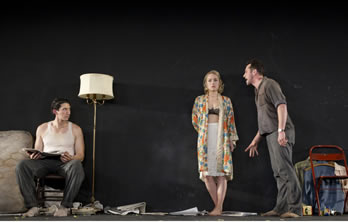HotReview.org Editor's
Pick
Shows Worth Seeing:

Look Back in Anger
By John Osborne
Laura Pels Theatre
111 W. 46th St.
Box office: (212) 719-1300
The Roundabout Theatre is an unfailingly middlebrow institution
that usually resists testing aesthetic thresholds. Thrillingly,
however, its current revival of Look Back in Anger is
a smartly risky venture that deserves the attention of anyone
interested in precise acting, intelligent dramaturgy, and luminous
cultural collisions. The American director Sam Gold has been pilloried
in some critical circles for taking what appears to be a high-concept
approach to this rebarbative and difficult 1956 British classic.
Gold has set the action not in a realistic one-room Midlands flat,
as John Osborne specifies, but rather on an absurdly narrow strip
of stage jammed up close to the audience, with nothing but a black
chalkboard wall behind and some shabby furniture and bric-a-brac
to suggest messy living quarters. This stripped down setting,
though, is as far as the concept goes. Unlike a high-handed European
director, Gold didn’t deconstruct the play or invent ingenious
antics to play against the text. Instead, he essentialized the
space and then filled it with the play-as-written, encouraging
his exquisite cast to explore the characters’ emotional
and psychological journeys as fully and deeply as possible. The
result is anything but an actor-stifling stranglehold, as some
reviewers have claimed, but rather a revelatory clash of theatrical
idioms that sets the old play off in bright, fresh relief.
Look Back in Anger is an aggressive drama, hard to stage
well in the contemporary U.S. because its specific postwar British
milieu is so crucial to understanding the bizarrely torrential
rage of its lead character, Jimmy Porter. Today’s American
audiences know little about the pressures and disappointments
of that era, and no painstakingly realistic setting is likely
to make them care. It was shrewd of Gold to observe that the right
actors could carry the burden of the milieu within them by making
their emotional interactions true, immediate and precise. We can
care about them, and the pathos of their suffering will make us
seek out the deeper causes for it in retrospect. Dazzling us with
period details would only have been distracting and dulling.
Matthew Rhys is extraordinary as Jimmy, a toxic teddy-bear of
a man who spits lacerating words at his loved ones on the slightest
pretext. The way his three stage partners bear his onslaught (Sarah
Goldberg as Jimmy's wife Alison, Adam Driver as his friend Cliff,
and Charlotte Parry as his frenemy and lover Helena), absorbing,
deflecting, redirecting, and tentatively returning his fire on
occasion, is impossible to look away from. Goldberg in particular
is deeply affecting as Alison, a brittle shell of smiling forbearance
who heroically holds her heartache within until it nearly drowns
her and she leaves to save both their lives. Yet the greatest
marvel of the show is the way the ridiculously empty set serves
as a flexible foil for the acting, reading one minute as a perfectly
aggressive complement to Jimmy’s vicious barbs, the next
as pungently desolate seasoning to everyone’s pain and despair.
What’s on display here is a dynamic and fruitful compromise
between Anglo and continental styles of a sort seen too rarely
in our theater. Don’t take anyone’s word for this
gem; you should appraise it for yourself.
